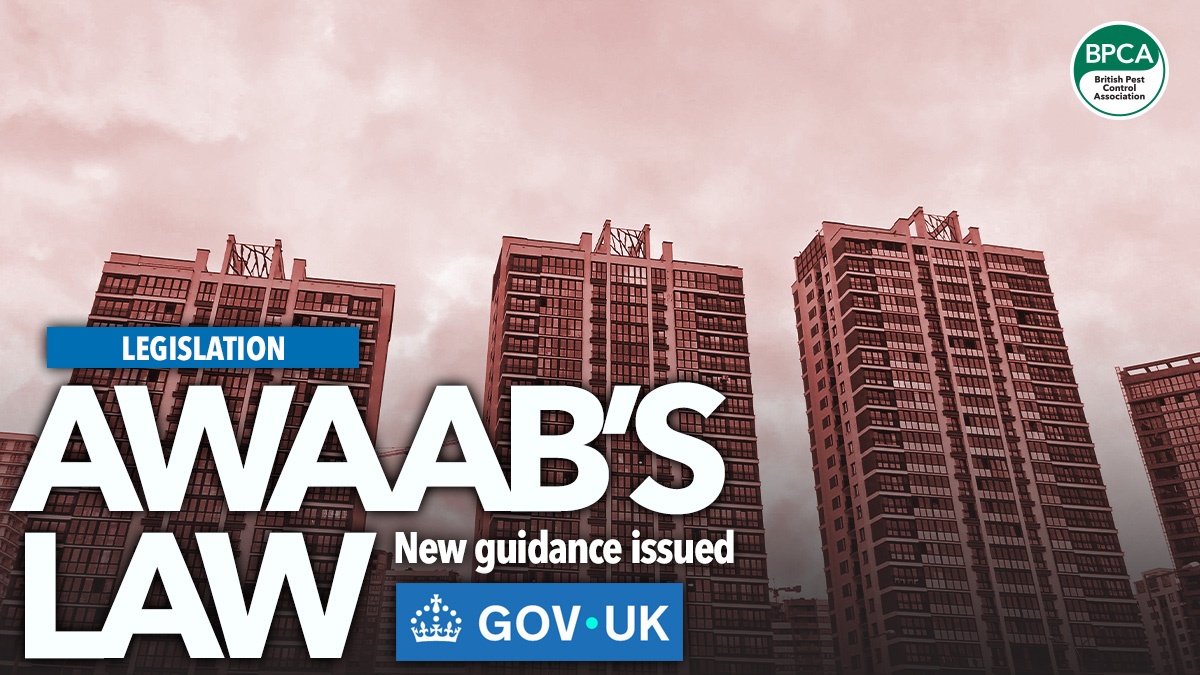LEGISLATION
On Monday this week (27 October 2025), Awaab’s Law entered into force. Applying to social landlords, their tenants are now protected against emergency hazards and significant damp and mould hazards.

Protections against other significant hazards like pests won’t start until next year, but that doesn’t mean pest professionals shouldn’t be aware of the current rules.
The Ministry of Housing, Communities and Local Government has issued guidance on the new regulations. While targeted at social landlords, it gives a clear understanding of their duties and responsibilities, and how you can best work with them to protect their tenants.
Working with social landlords
As a contractor working for a social landlord (a local authority or a registered housing association), you are meant to be made aware of several things:
- You are aware of the timeframes they have to meet
- You will be asked to provide them with all the relevant information required for their written summaries
- You report to them any safeguarding, health and safety issues, or (potential) hazards that you become aware of when you visit a property.
Landlord timeframes for fixing hazards
The social landlord has several timeframes they have to meet.
For emergency hazards (where there is an imminent and significant risk of harm), they must investigate and carry out repairs within 24 hours of becoming aware of the hazard.
If the emergency repairs cannot be completed within 24 hours, the tenant must be provided with alternative accommodation.
Some of the examples of emergency hazards included in the guidance are:
- Gas or carbon monoxide leaks
- Broken boilers
- Total loss of water supply
- Significant leaks
- Broken external doors or windows that present a risk to home security
- Significant structural defects or disrepair.
Significant hazards, including anything a reasonable person would consider a risk to the tenant’s health or safety, should be investigated within 10 working days.
After the investigation, the landlord has five working days to complete the safety works and begin steps to prevent the issue from recurring. If the safety works cannot be completed in five working days, alternative accommodation must be found.
Currently, under this first phase, the only significant hazards covered are those of damp and mould. However, in phase two, pest control issues and many other hazards will also be included.
Unless the works phase of either an emergency or significant hazard is resolved within three working days, the social landlord must also produce a summary to tenants. You will therefore need to be able to supply information to the landlord, which may include the actions you are taking and timeframes for them, or even why no action is required.
Paperwork is key
It is also essential that you document and report to the landlord any other issues you become aware of while on the property.
Some members have already reported that they’ve been asked to complete hazard-impact questionnaires covering any hazards they observe while working in a social property.
Depending on the details of your contractual relationship with the landlord, the timeframes may start as soon as you become aware of the issue, not necessarily when you inform the landlord.
Ultimately, it is the landlord's responsibility to clarify those contractual details, but proactivity will help ensure compliance.
Phase two: pest control issues
Being aware of the changes now is important, but when pest issues are included under the second phase (October 2026), your reports to social landlords will be even more crucial.
Until then, the only action you should take is to ensure all other issues you spot in homes are documented and reported to the landlord.
Helping the landlord remain compliant will benefit your working relationship and ultimately help the tenant.
The future of Awaab’s Law and the private sector
From October 2027, the third phase of Awaab’s law will come into force, expanding the list of hazards that you will need to report should you come across them. However, this will not include the hazard of overcrowding.
The government has indicated that all of these protections for social tenants will eventually be extended to the private sector.
On Monday, the Renters’ Rights Bill received Royal Assent and became law. One of the key measures of this legislation is that Awaab’s law would also apply to the private sector.
When this will take effect is currently unclear, with no date set.
Source: